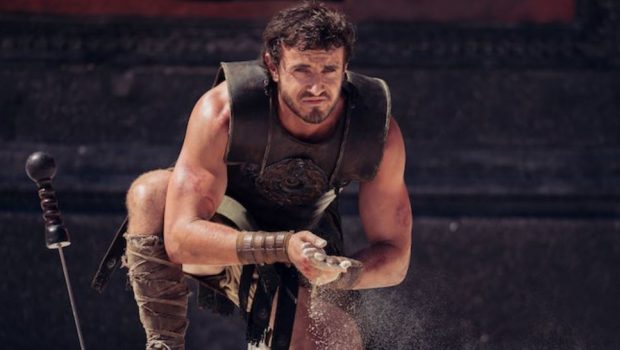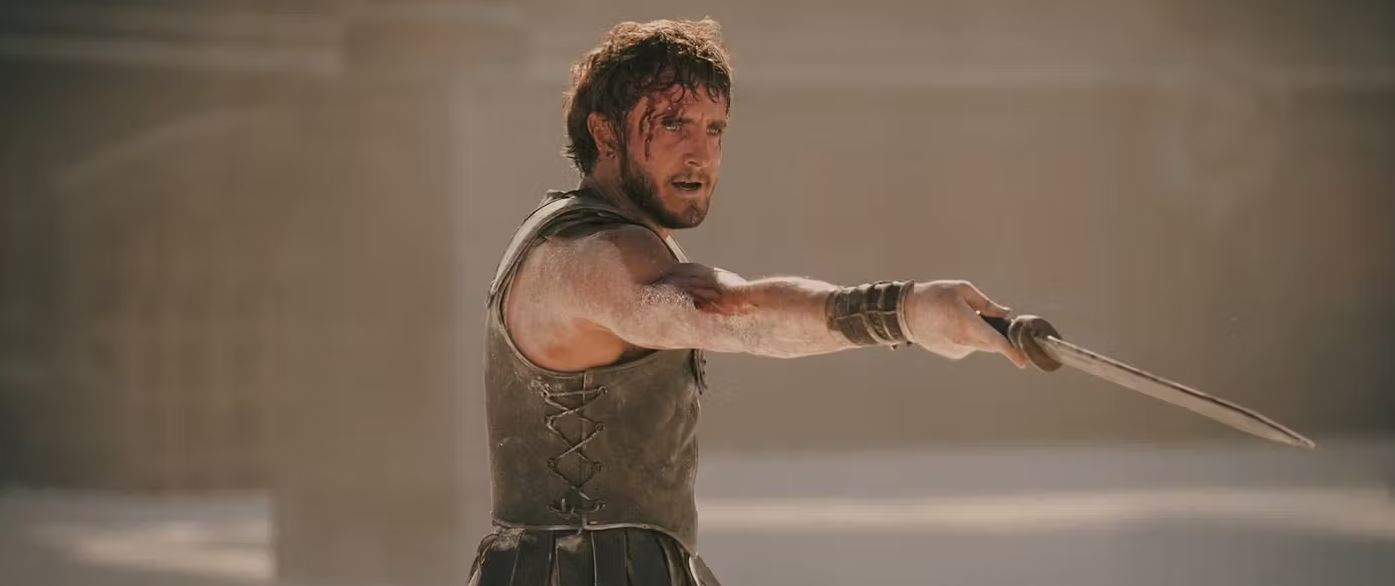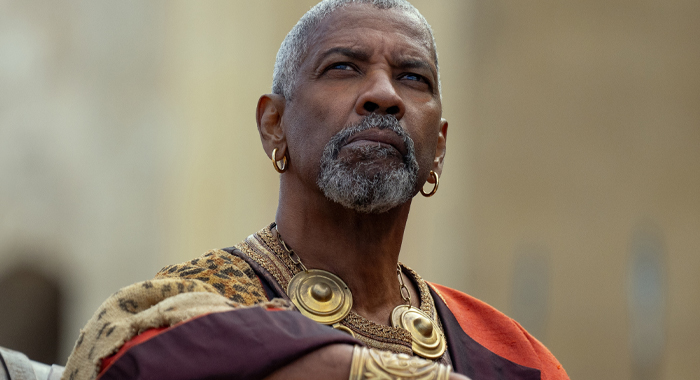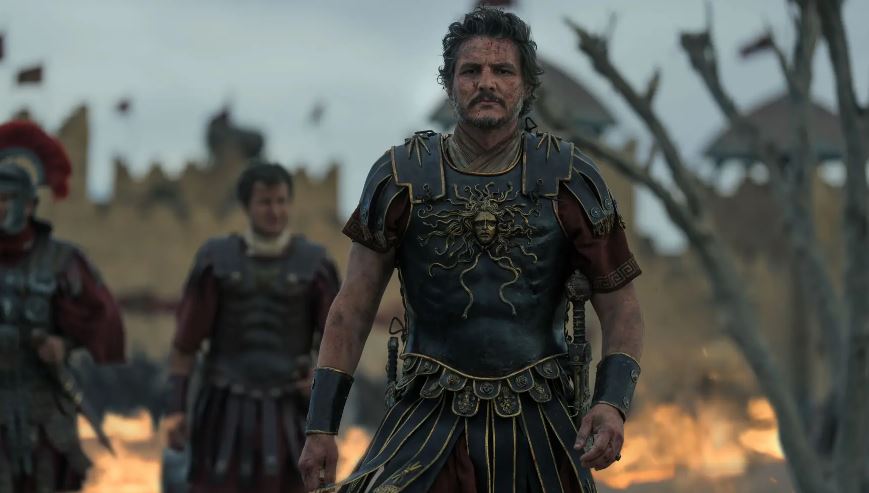Gladiator II – Film Review
Reviewed by Damien Straker on the 12th of November 2024
Paramount Pictures presents a film by Ridley Scott
Screenplay by David Scarpa based on a story by Peter Craig and David Scarpa
Produced by Ridley Scott, Michael Pruss, Douglas Wick, Lucy Fisher, Walter F. Parkes, Laurie MacDonald, David Franzoni
Starring Paul Mescal, Pedro Pascal, Joseph Quinn, Fred Hechinger, Lior Raz, Derek Jacobi, Connie Nielsen, and Denzel Washington
Cinematography John Mathieson
Edited by Claire Simpson and Sam Restivo
Music by Harry Gregson-Williams
Rating: M
Running Time: 148 minutes
Release Date: the 14th of November 2024
Gladiator II is bigger, louder, and more fragmented than its predecessor but not better. Its narrative shortcomings are apparent in a critical moment where its titular hero is told he is driven by rage. ‘Told’ is a critical failure of this clumsy sequel. It typifies how the emotions of anger and betrayal are telegraphed and spoken but not felt by the audience with the same impact as before. It is not as though director Ridley Scott, now eighty-six, forgoes the visceral brutality of the gladiatorial world.
He still competently stages violent, large-scale action scenes with maximum clarity. However, his failure to recapture the strong emotional through-line and the sense of defiance from the first entry makes this an inferior sequel. Having recently revisited the original at the cinemas, it has aged surprisingly well. It remains a sharply crafted sword-and-sandal crowd-pleaser that soars above the visible weaknesses of this film and its flawed, modern techniques.
It is worth reading about how this sequel was workshopped as far back as 2001. Various ideas, including a completely insane plot device by Australian singer and writer Nick Cave, were pitched. Now screenwriter David Scarpa has replaced the original film’s writers, David Franzoni, John Logan, and William Nicholson. Working with a story by Peter Craig, Scarpa sets the film sixteen years onwards. The original story climaxed with the gladiator Maximus (Russell Crowe) perishing just as he defeated the mad Emperor Commodus (Joaquin Phoenix). Now we are told Rome has descended into total corruption again. It is now ruled by two redhead psychopathic twins, Emperor Geta and Emperor Caracalla (played by Joseph Quinn and Fred Hechinger, respectively). They demand total domination from their generals, including Marcus Acacius (Pedro Pascal, underused). In the film’s opening scenes, Marcus launches a powerful naval attack that meets some resistance.
A warrior and farmer named Lucius (Paul Mescal) and his wife (Yuval Gonen) are part of the army attempting to deter the invaders. However, his wife is killed in battle (always) and then he is cast into slavery. His determination to seek revenge on Marcus is noticed by a crafty bisexual slave-owner named Macrinus (Denzel Washington). He presses him to fight hard in the Colosseum, but he has his own sinister political agenda. Meanwhile, Marcus and his wife, Lucilla (Connie Nielsen), Commodus’ sister and daughter of Marcus Aurelius, are endangered after he resists the twins’ calls to continue their deadly military operations across the land.
Gladiator II starts as a beat-for-beat remake of the original but lacks the same deft story transitions. Lucius’s trajectory from a warrior to a slave and then a gladiator completely mimics Maximus’ journey. Yet the frantic pacing leaves the drama rushed and fragmented. The exposition dispels the patient build-up where Maximus’ planned succession was shortly undermined by betrayal and jealousy. It then saw him exiled long before the gladiatorial scenes. The detailed heroism of Maximus is missing too. As a man disinterested in power and politics, he declined to be Marcus Aurelius’ heir. Yes, things were so dandy back then a man could reject a promotion. He was also a soldier and a farmer and warmed by the love of his wife and son.
Here the derivative scenario, paired with Lucius’ flimsy characterisation, removes the dramatic punch. Lucius is just another ripped, quippy dude who adeptly swings a sword. His wife is never developed properly as a character before being murdered and the absence of Crowe’s resilient, poignant turn lingers over each hurried scene. Instead, Scarpa’s script tries broadening its scope with mixed results. Introducing a second anti-hero in Marcus leaves the narrative disjointed. It lacks the thrilling simplicity of before: a battle of wills between a powerful hero and a terribly menacing villain. The original also contrasted evenly between one man descending into madness and another challenging Rome’s entire ruling class. It was not wildly original, but its story’s efficiency and power were undeniable.
After closely shadowing its predecessor, Gladiator II veers into a clumsy extension of the original story. There are no shortages of genuine surprises, which is welcome. However, these same surprises also make no sense if you are even slightly well versed in Gladiator’s plotting, particularly its ending. Commodus’ death helped salvaged the Roman Senate from being liquidated. There is no reason then for Lucius’s separation from his family. Where was the danger? There is also little context or backstory then around the two new co-emperors. How these two idiots, who look like a cross between the Weasley twins and Ed Sheeran, ascended to power in less than two decades is one for the history and scriptwriting books. Then there is the delicate subject of the characters’ bloodlines. What emerges here is frankly as unearned as the turns in Star Wars: The Rise of Skywalker (2019). There are ‘shocking’ twists with absolutely no breadcrumbs, no moments in the prequel to reflect upon and pinpoint as justification for the present moment.
The film doesn’t even commit to one late surprise. Macrinus reveals something about himself that is so rushed and hazy it leaves the audience confused. One could take these twists on face value, but they betrayal the moral fabric of the original’s heroes. One might also discard continuity in a movie where a man rides a deadly rhino into a wall. That would be fair if Gladiator II did not constantly lift from the past. However, blind nostalgia was never Marcus Aurelius’ dream! Story beats, images (Maximus’ armour and sword appear), lines of dialogue, and the same closing song, are all recycled. In other words, Gladiator II frequently references the past while failing to understand the depth of its predecessor’s characters.
This is not to say the sequel is engineered without skill by its highly seasoned director. One heavy blow this film lands is the clarity of its combat. As expected, the production design by Arthur Max is superbly realised, particularly the film’s opening battle. The battleships tear across the open sea and then the soldiers desperately scramble for cover and scale ladders as they are pelted by a flurry of arrows. Scott and his cinematographer John Mathieson film the sequence and its combat movements with an alarming amount of vision, skill, and urgency. This sequel admittedly possesses some clearer choreography than the original. Though the special effects in the killer baboon sequence are surprisingly poor and none of the big battles compare favourably to the prequel’s glorious opening.
Perhaps the absence of Hans Zimmer’s incredible music score is felt too. It elevated a straightforward, visceral action movie into something grander, more emotional. Equally concerning is how clumsy and derivative this film’s climax is written and staged. A deadly sword strike recalls the knight from Monty Python having his arms lopped off. Will we ever see a blockbuster film again that doesn’t just end in a fist fight? With apologies to Kevin Feige, it’s just tiring. Considering how much effort is put into the opening and how incredible the action was staged in Scott’s Napoleon (2023), the climax here is surprisingly clumsy and generic.
While buoyed by well-choreographed action and a cast committed to the characters’ grief and wounded intensity, Gladiator II’s screenplay is wildly inconsistent. Its surprises will divide the original’s fans and leave others underwhelmed and uncurious. It lacks its predecessor’s efficiency and relies too heavily on its modern stylings, including excessive nostalgia, fragmented storylines, and twists and revelations that feel quick and unearned. For this reason, it stumbles as both a scene-for-scene remake and as a sequel because it never leaves the original’s shadow. It is not a complete disaster (the terrible ending aside), but it never justifies itself as a new, worthy champion. Are you not entertained? Killer baboons aside, only mildly.
Summary: Gladiator II is bigger, louder, and more fragmented than its predecessor but not better. It looks strong but lacks emotion and concludes with a terrible finale.











